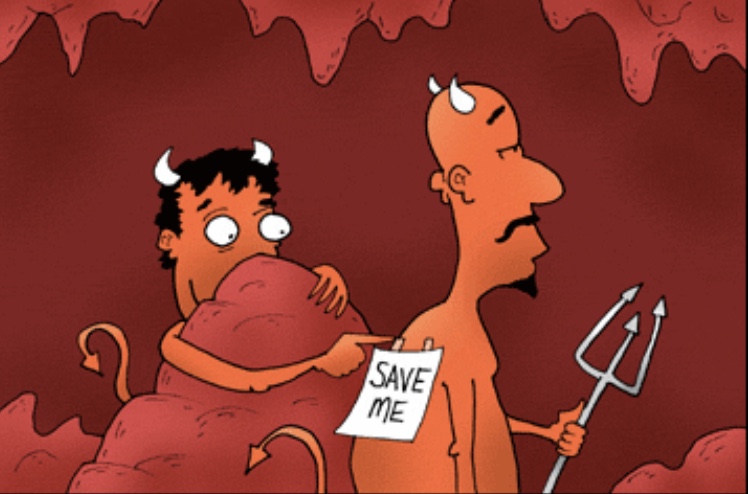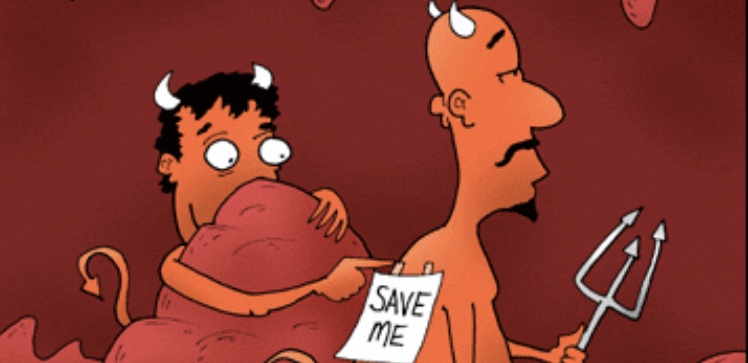
BECAUSE THE SATANIC Temple doesn’t believe in a literal Satan, or in anything supernatural, it’s often presented in the media as a joke religion like the Church of the Flying Spaghetti Monster or the Church of the SubGenius. But Penny Lane, director of the new documentary Hail Satan?, says that’s a total misconception.
“The Satanic Temple would very much like for people to, perhaps, learn to judge other people based on their actions, not based on what they look like or what you might have heard about them on daytime television,” Lane says in Episode 361 of the Geek’s Guide to the Galaxy podcast.
The group is best known for its activism on the issue of separation of church and state. One scene in the film shows the Temple’s spokesperson, Lucien Greaves, strapping on a bulletproof vest before appearing beside the group’s controversial statue of Baphomet. Lane says that sort of risk-taking demonstrates real devotion.
“It’s not an either/or proposition,” she says. “Yes, they are internet trolls and pranksters, and they really are Satanists. Both of those things are true. Because the core of Satanism is to embrace joking and pranking and being mischievous and freaking people out. That’s the heart of the religious identity. It’s not evidence that they’re insincere. It’s actually part of it.”
Lane also says it’s not unusual for religious movements to have humble beginnings. “Probably many of the religions that we now take for granted as being ‘real’ started out with cons or press conferences or lying or magic tricks,” she says. “It’s good marketing. But then once you get there, what do the ideas have to offer? People don’t stick around for Satanism just because it’s funny. People stick around because—for a person who is a Satanist—Satanism brings them a great deal of meaning and value.”
And just as the Satanic Temple uses humor to communicate a serious message, Lane hopes that her documentary does the same.
It’s really something to behold when you see these crowds walking out of a theater with these gigantic smiles on their faces,” she says, “because they’ve obviously had this fun experience that’s given them joy and uplift and inspiration. But there’s also kind of this strange look on their face—of concern—because they’re really trying to figure out if they’re a Satanist or not, and they’ve never had to ask that question before.
Listen to the complete interview with Penny Lane in Episode 361 of Geek’s Guide to the Galaxy (above). And check out some highlights from the discussion below.
Penny Lane on Ten Commandments monuments:
The monuments were created to look like the stone tablets that are carried down by Charlton Heston in the Cecil B. DeMille film The Ten Commandments. It’s a particular design that was made by a civic group in the 1950s, but the promotion and spread and creation of those monuments was funded and supported in part by Paramount pictures as kind of a tie-in with their film … It’s really reminiscent of other monument battles, like with the Confederate monument battles as well, where it seems like these are from a really old time in American history that we should preserve, but often you see that they’re quite new, and they don’t have the cultural heritage and history behind them that we’re told they have.
Penny Lane on the Satanic Panic:
Let’s say you’re a high school teacher in a small town, and someone comes up with these crazy accusations that you’re part of a Satanic cult and you’ve been raping children after school or something. In most cases what would happen is that person would just leave town. They would quit their job—or get fired—and no charges were filed, but they have had their life fairly well disrupted or ruined, and their reputation disrupted or ruined as well. There are countless stories like that that we’ll never really know the numbers on, because we don’t have court records or something to refer to. So the nature of the problem was actually so extensive that it’s hard to even measure the impact of it.
Continue reading here.
[Editor’s Note: This article was written and originally published at Wired. Title changed by P&P.]











